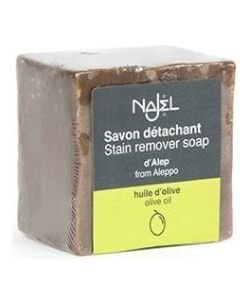This soap based on olive oil is ideal for overcoming the stubborn stains or for a laundry by hand.
Stain the natural solution
This soap stain remover is used to remove stubborn stains before putting the laundry in the machine or for hand washing.
Olive oil, known for such cleaning and degreasing qualities when saponified, is the main ingredient of this natural soap Aleppo.
Indication
The first primitive soap consisted of wood ash and other plants, by extraction with water. Ashes from halophytes - plants from the Mediterranean region - such as cockle, Salicornia and soda, were particularly effective in making soap.
The cleansing properties of these alkaline solutions were probably discovered by chance. Soap word comes from the name of the Italian city Savona where large quantities of soap were manufactured during the 9th century AD.
The oldest reference to the manufacture of soap dates back to 2,800 BC. JC To make soap, was boiled fat which was added ashes. It was after much trial and error that the Gallic and Germanic tribes discovered the saponification process.
In the Middle Ages, soap was used primarily to wash clothes. In the 7th century, Arab traders did discover the peoples of Europe bar soaps. Quickly, soapmaking became an established craft in Europe and soap manufacturers banded together in craft guilds to jealously protect their trade secrets.
Soap production began to differentiate themselves from one region to another. In Mediterranean countries such as Italy, Spain and southern France, soap was made with olive oil.
The cleansing properties of these alkaline solutions were probably discovered by chance. Soap word comes from the name of the Italian city Savona where large quantities of soap were manufactured during the 9th century AD.
The oldest reference to the manufacture of soap dates back to 2,800 BC. JC To make soap, was boiled fat which was added ashes. It was after much trial and error that the Gallic and Germanic tribes discovered the saponification process.
In the Middle Ages, soap was used primarily to wash clothes. In the 7th century, Arab traders did discover the peoples of Europe bar soaps. Quickly, soapmaking became an established craft in Europe and soap manufacturers banded together in craft guilds to jealously protect their trade secrets.
Soap production began to differentiate themselves from one region to another. In Mediterranean countries such as Italy, Spain and southern France, soap was made with olive oil.
Use
- For stubborn stains, simply soap the moistened area then let stand a few minutes.
- Najel also advises its use for washing pets. Indeed, the Aleppo soap made entirely with olive oil is totally healthy for animals to be clean and have the silky hair.
Composition
30% or more of Aleppo soap.
Packing
Soap about 180g (product subject to drying)
Najel
Najel
This site contains a significant amount of information. This is not a medical site. The exempted reflections, can never be a substitute for a consultation with a doctor or therapist that you return for your follow-up contact.
Comment (9) -
Comments from others countries
Christine V.
> 65 years

24/06/2021
J'en avais déjà acheté et étant très satisfaite des résultats, j'en ai racheté.
Khedidja A.
45-55 years

15/05/2020
Très bon détachant, je l'utilise surtout pour les sous-vêtement
Marie-Pierre V.
> 65 years

05/02/2020
sent très mauvais, inefficace!
Bernadette H.
> 65 years

05/05/2017
Surprenant d'efficacité et bien mieux pour la santé de l'utilisateur et sa famille et l'environnement que Vanish et autre mr Propre !!!
Dominique R.
> 65 years

12/10/2016
odeur de rêve ! et pour faire un petit cadeau aux copines
35-45 years

26/08/2016
Très efficace! Il rempli super bien sa mission même si l'odeur me dérange un peu
Kédy K.
45-55 years

29/06/2016
Enlève bien les taches que certains produits chimiques zappent !
Jeanine N.
> 65 years

05/12/2014
Je ne l ai pas encore utilise.
Gaelle A.
35-45 years

02/07/2014
a avoir absolument chez soi,détache tout
Log in to add a comment.New client ?
Start here .
Customers who bought this product also purchased

Copyright© 2004-2026 Idily n°Siret 51151936500015 - VAT number FR65511519365 - VAT number BE0425925218

